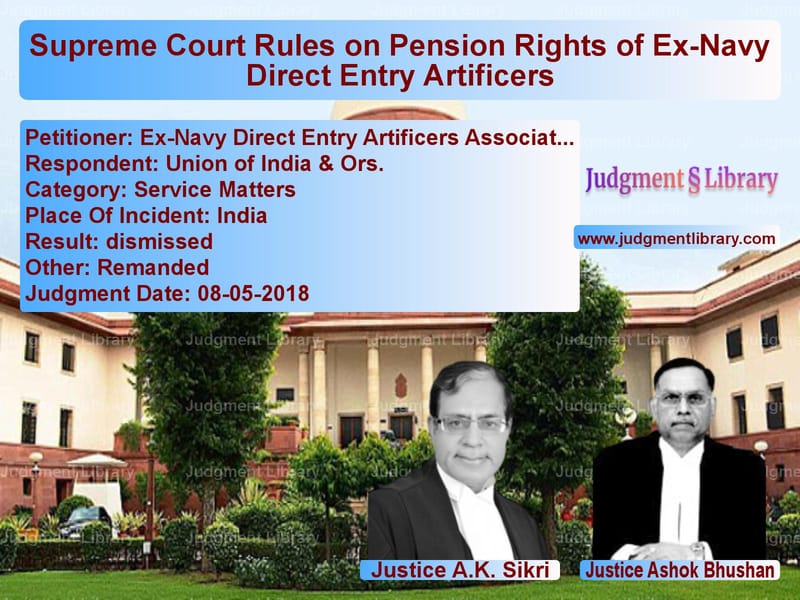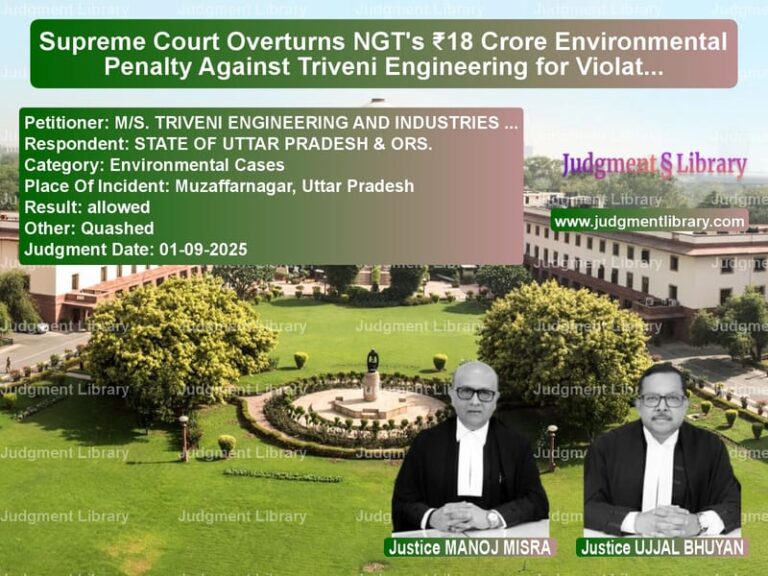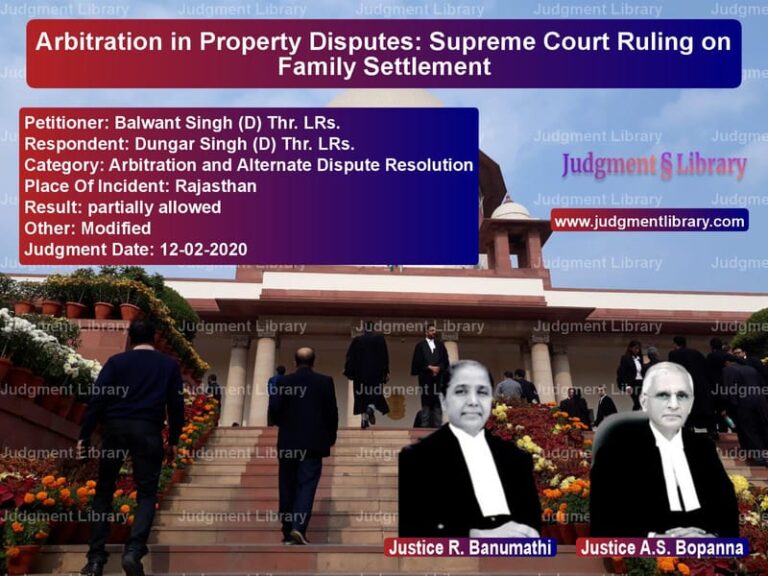Supreme Court Rules on Pension Rights of Ex-Navy Direct Entry Artificers
The case of Ex-Navy Direct Entry Artificers Association & Ors. vs. Union of India & Ors. addresses the critical issue of pension eligibility for Navy personnel. The Supreme Court was tasked with deciding whether the appellants, who had served 10 years of active duty, could count their reserve liability towards pension eligibility.
The Court examined whether these artificers were drafted into Fleet Reserve and, if so, whether their service period should be calculated to meet the 15-year pension eligibility requirement under the Navy (Pension) Regulations, 1964.
Background of the Case
The appellants, members of the Ex-Navy Direct Entry Artificers Association, sought pension benefits after their service in the Indian Navy. They argued that:
- They had served 10 years of active service.
- They were placed in Fleet Reserve for another 10 years.
- Under Navy regulations, 50% of reserve service should be counted toward pension eligibility.
The government, however, disputed their claim, stating that they were never formally drafted into Fleet Reserve.
Key Legal Issues Considered
The Supreme Court examined two fundamental questions:
- Whether the reserve liability imposed at the time of enrolment automatically amounted to Fleet Reserve service.
- Whether Direct Entry Artificers should be treated on par with Apprentice Entry Artificers for pension purposes.
Arguments of the Parties
Petitioner’s (Ex-Navy Artificers) Arguments
The appellants contended:
- They were initially informed that after 10 years of active service, they would be placed in Fleet Reserve.
- 50% of their reserve service should be counted towards pension qualification.
- Apprentice Entry Artificers received pension benefits despite having a similar service structure.
- The denial of pension violated Article 14 of the Constitution, ensuring equality before the law.
Respondent’s (Union of India) Arguments
The government countered:
- There was no official record indicating that the appellants were drafted into Fleet Reserve.
- The policy of transferring sailors to Fleet Reserve was discontinued in 1976.
- Apprentice Entry Artificers received pension because their training period was counted as service.
- The appellants’ claims were not supported by Navy regulations.
Supreme Court’s Ruling
The Supreme Court ruled against the appellants, stating that they were never formally drafted into Fleet Reserve. Key findings included:
“The liability to serve in the Indian Fleet Reserve, if required, is not automatic. A sailor must be officially drafted into Fleet Reserve for it to count towards pension eligibility.”
The Court made the following observations:
- The regulation only made sailors ‘liable’ for Fleet Reserve, not entitled.
- There was no evidence of an express order drafting the appellants into Fleet Reserve.
- The government’s decision to discontinue Fleet Reserve transfers in 1976 was legally valid.
- The appellants’ reliance on Promissory Estoppel was misplaced, as no firm promise was made.
Implications of the Judgment
The ruling has significant implications for pension rights in the armed forces:
- Clarifies that reserve liability does not automatically translate into Fleet Reserve service.
- Ensures that pension eligibility remains based on actual service rendered.
- Maintains consistency in applying Navy regulations.
Special Pension Consideration
While denying the claim for a regular pension, the Supreme Court ruled that the appellants should be considered for a special pension under Regulation 95 of the Navy Pension Regulations. The Court directed the government to review their cases within three months.
Key Takeaways
- Automatic drafting into Fleet Reserve does not exist without an express order.
- Direct Entry Artificers cannot claim pension benefits given to Apprentice Entry Artificers.
- The discontinuation of Fleet Reserve transfers in 1976 is legally valid.
- The government must review special pension eligibility for affected personnel.
Conclusion
The Supreme Court’s ruling in Ex-Navy Direct Entry Artificers Association & Ors. vs. Union of India & Ors. reinforces the principle that pension benefits must be based on actual service records and formal transfers. The Court’s decision upholds the regulatory framework while ensuring that affected personnel receive fair consideration under special pension provisions.
Petitioner Name: Ex-Navy Direct Entry Artificers Association & Ors..Respondent Name: Union of India & Ors..Judgment By: Justice A.K. Sikri, Justice Ashok Bhushan.Place Of Incident: India.Judgment Date: 08-05-2018.
Don’t miss out on the full details! Download the complete judgment in PDF format below and gain valuable insights instantly!
Download Judgment: Ex-Navy Direct Entry vs Union of India & Ors Supreme Court of India Judgment Dated 08-05-2018.pdf
Direct Downlaod Judgment: Direct downlaod this Judgment
See all petitions in Pension and Gratuity
See all petitions in Public Sector Employees
See all petitions in Disciplinary Proceedings
See all petitions in Judgment by A.K. Sikri
See all petitions in Judgment by Ashok Bhushan
See all petitions in dismissed
See all petitions in Remanded
See all petitions in supreme court of India judgments May 2018
See all petitions in 2018 judgments
See all posts in Service Matters Category
See all allowed petitions in Service Matters Category
See all Dismissed petitions in Service Matters Category
See all partially allowed petitions in Service Matters Category







